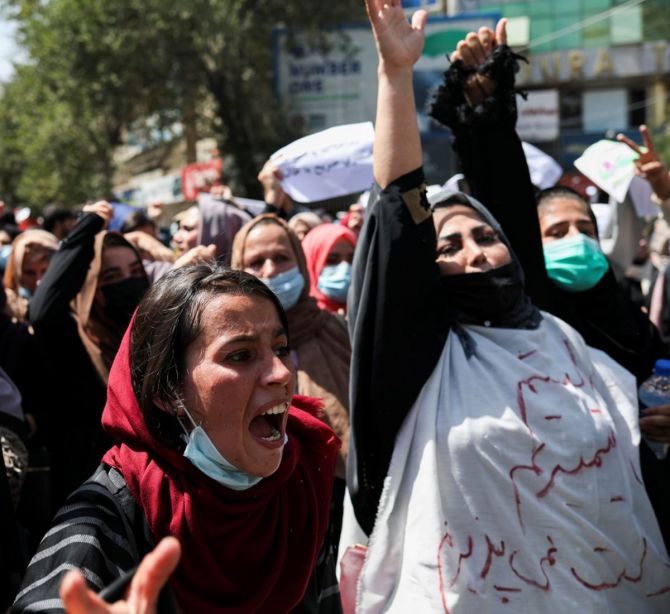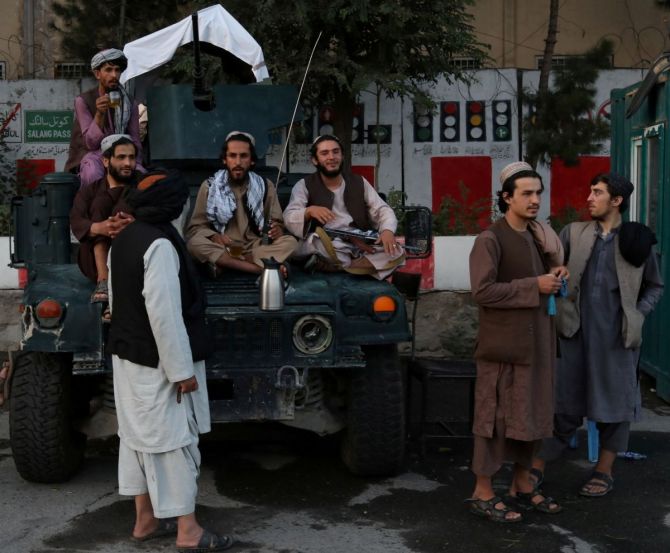US Secretary of State Antony Blinken was asked by US Congressmen if the US had explore the possibility of northwest India for counter terrorism capabilities in Afghanistan.
Blinken's remarks on India assume great importance, observes Ambassador M K Bhadrakumar, who played a stellar role in beginning India's dealings in Afghanistan in 1994.

In England, they'd plan a park, build it but wouldn't complete it until they could observe for a while the foot tracks of walkers, before deciding where to lay the pathways for optimal utility.
The Blinken administration and Modi government apparently think they don't have that luxury when it comes to Afghanistan.
That is the troubling signal out of the Congressional hearing on Monday in Washington with Secretary of State Antony Blinken.
For a start, Blinken was rather muted in his reaction on Pakistan's perceived duplicity in taking advantage of the US.
Certainly, he would know three things.
First, such discords in the US-relationship are nothing new.
Second, while the present is full of hiccups in the relationship over the Taliban's seizure of power in Afghanistan, the future beckons the imperative need for Pakistan's cooperation.
Third, Blinken is well aware that his cannot be the last word on the topic.
In fact, as Blinken spoke, General Scott Berrier, who leads the Defense Intelligence Agency, gave the estimate while speaking at the Intelligence and National Security Summit that al-Qaeda may be only 12 to 24 months from reconstituting itself in Afghanistan to pose a significant threat to the United States.
How far such a prognosis is warranted remains a matter of conjecture.
To my mind, an-Qaeda reboot in Afghanistan is highly improbable.
But the US intelligence and Pentagon would sense the urgency to consult Pakistan.
CIA Director William Burns met Pakistan's army chief General Qamar Javed Bajwa twice recently.

This is where Blinken's remarks on India assume great importance.
He was frontally asked by a powerful Republican Congressman Mark Green whether the US has sought to explore the possibility of over-the-horizon capabilities in northwest India for counter terrorism capabilities in Afghanistan:
'Considering rumours of ISI's support for the Taliban, have you guys reached out to India as a possible staging area for the over-the-horizon forces? I'm talking about northwest India as a potential because we all know Qatar and Doha, the other places, are just a little bit too far. Kuwait, all of that. What about northwest India? And have you reached out -- have you thought about that?'
Republican Congressman Scott Perry also chipped in: 'I would say that we should no longer pay Pakistan and we should pay India.'
But Blinken reacted evasively: 'Generally, Congressman, we're deeply engaged with India across the board. With regard, though, to any specifics about over the rise in capabilities and the plans that we put in place and will continue to put in place, I'd rather take that up in a different setting.'
Put differently, Blinken hinted that the subject is far too sensitive to be discussed publicly, and he'd rather have an in camera hearing.
Notably, Blinken did not reject the US Congressmen's suggestion but prefers a closed-door discussion.
Which is a tacit acknowledgment that it is an open file.

Playing Pakistan against India comes out of the US toolbox.
In 2001 too, India's zeal to partner the US in the overthrow of the Taliban regime hustled Pervez Musharraf.
At any rate, don't be surprised.
I had predicted this to happen as early as late April, in anticipation of the inevitability of a Taliban takeover in Afghanistan.
In historical terms, the wheel has come full circle.
We are circa 2003 when the George W Bush administration discreetly broached the topic of participation by an Indian Army contingent in the US invasion of Iraq.
The liberal internationalist lobby in New Delhi felt enthralled at the prospect of an Indian expeditionary mission to Iraq assisting the only superpower on the planet.
Thank God, then Prime Minister Atal Bihari Vajpayee put his foot down with a firm 'Nyet' that saved India's reputation.
Curiously, the US lawmakers broached this sensitive topic when a visit by Prime Minister Narendra Modi to the White House is due in 10 days's time.
Ask the Russians: They'll tell you from Cold War experience how such exchanges on Capitol Hill are almost always carefully choreographed.
This is a highly disturbing scenario. Delhi's strategic silence is not helping matters.
Meanwhile, Ecternal Affairs Minister Subrahmanyam Jaishankar's speech at the UN conference on September 13 regarding aid to Afghanistan has faithfully toed the American line -- that the Afghan government should be bypassed in the dispatch and distribution of international humanitarian aid.
Jaishankar has prescribed ditto what the US has doing to Syria with a view to somehow undermine the legitimacy of the Bashar al- Assad government.
Afghanistan's sovereignty and territorial integrity is in meltdown and it is extremely damaging for India's long term interests if the Afghan State collapses.
This is just not the time for Jaishankar to play zero-sum games vis-a-vis Pakistan or China -- or both.

The Taliban is on record categorically that it will oppose 'over-the-horizon' military interventions in Afghanistan.
It insists that such military operations on Afghan soil will be its sovereign prerogative. Rightly so.
In strictly legalistic terms, the Logistics Exchange Memorandum of Agreement of August 2016 with the US may provide for the two militaries to work closely and use each other's bases in the given situation where the US is planning operations in Afghanistan.
But no matter the Indian security establishment's past antipathy toward the Taliban, Afghanistan still remains a friendly country and wanton Pentagon air/missile strikes have a whole history of killing civilians.
We just saw how 7 children were killed in a drone strike in Kabul on August 28, with Pentagon lying.
Most important, by facilitating the Pentagon's military operations from Indian soil, Delhi is undercutting its own case that Taliban should not allow Afghan soil to be used against India.
Ironically, Taliban Foreign Minister Muttaqi just stated in Kabul, 'We will not allow anyone or any groups to use our soil against any other countries.'
This is the first confirmation from the interim government of the new Taliban cabinet's intention to honour a deal the Taliban reached with the US last year in Doha.
Above all, what is the guarantee that in a volte-face, the US doesn't kiss and make up with the Taliban?
Such policy somersaults are endemic to US regional strategy.
India lives in its region and must not antagonise the Taliban for America's sake.
Vajpayee had set a great tradition to sense the opinion of Parliament on such issues of great consequence.
Ambassador M K Bhadrakumar, who headed the Pakistan-Iran-Afghanistan desk at the ministry of external affairs in the 1990s, served the Indian Foreign Service for 29 years.
Feature Presentation: Aslam Hunani/Rediff.com










